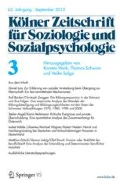Zusammenfassung
Eine empirische Anwendung der Rational Choice Theorie auf die Frage der Ungleichheit der Bildungschancen kann zwar auf durchaus plausible Argumente aufbauen, bei genauerer Betrachtung sind jedoch erhebliche Probleme zu konstatieren im Hinblick auf: die Operationalisierung der Variablen; die Erklärungskraft vor allem der zentralen Variablen der SEU-Variante der RC Theorie; und die systematische Ausblendung sowohl individuenbezogener wie strukturell-institutioneller Faktoren, die möglicherweise sehr viel mehr erklären als subjektive Kosten-Nutzenüberlegungen.
Abstract
There are several plausible arguments which make it obvious to apply Rational Choice Theory to the process of educational opportunities and equality. Looking more closely at an empirical application or RC theory, several serious problems emerge: They concern the operationalization of the variables, the explanatory power of the central variables related to Subjective Expected Utility, the systematic omission of important variables relating to individual persons and their identity, and to social structural and institutional factors; the latter seem to be much more important than those indicated by RC approaches.
Literatur
Becker, Rolf, 2000: Klassenlage und Bildungsentscheidung. Eine empirische Anwendung der Wert-Erwartungstheorie, Kölner Zeitschrift für Soziologie und Sozialpsychologie 52: 450–474.
Erikson, Robert, und Jan O. Jonsson, 1996: Explaining Class Inequality in Education: The Swedish Test Case, S. 1–63 in: Robert Erikson und Jan O. Jonsson (Hg.): Can Education Be Equalized? Boulder: Westview Press.
Esser, Hartmut, 1999: Soziologie. Spezielle Grundlagen. Band 1: Situationslogik und Handeln. Frankfurt a.M.: Campus
Haller, Max, 1999: Soziologische Theorie im systematisch-kritischen Vergleich. Opladen: Leske + Budrich.
Scherr, Albert, 1995: Soziale Identitäten Jugendlicher. Opladen: Leske + Budrich.
Schmidt, Jürgen, 2000: Die Grenzen der Rational Choice Theorie. Eine kritische theoretische und empirische Studie. Opladen: Leske + Budrich.
Author information
Authors and Affiliations
Corresponding author
Additional information
Für detaillierte, geduldige Hinweise auf Details der Studie und zusätzliche Berechnung bestimmter Kenngrößen bin ich Rolf Becker zu Dank verpflichtet.
Rights and permissions
About this article
Cite this article
Haller, M. Erklärt die Rational Choice Theorie die Ungleichheit der Bildungschancen?. Koelner Z.Soziol.u.Soz.Psychol 53, 569–574 (2001). https://doi.org/10.1007/s11577-001-0079-1
Published:
Issue Date:
DOI: https://doi.org/10.1007/s11577-001-0079-1

